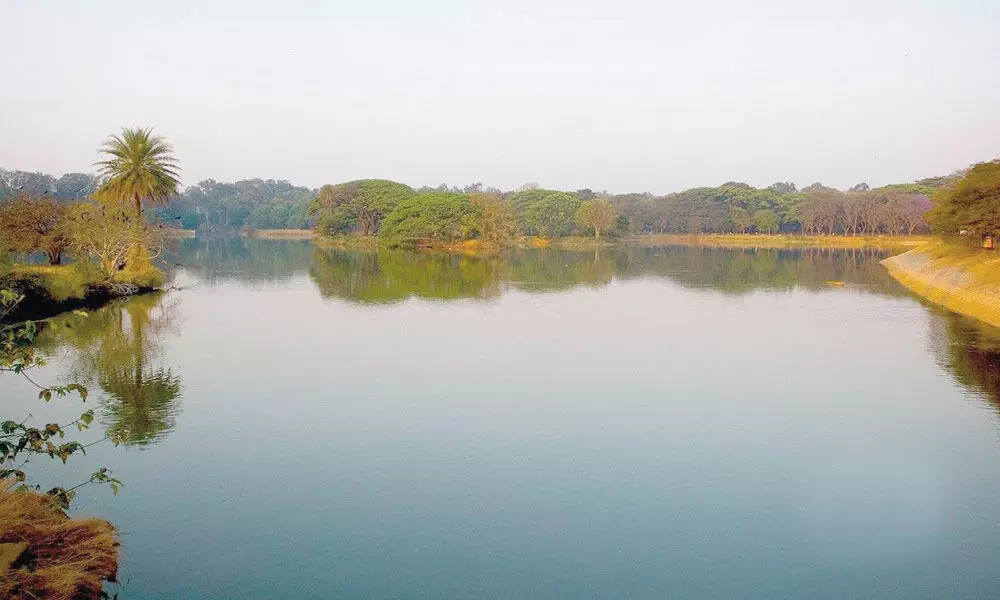Live
- Sikkim govt to constitute state Niti Ayog: CM Tamang
- CBI books Rajasthan narcotics inspector for Rs 3 lakh bribe
- Rajasthan bypolls: A tough contest between BJP and Congress
- Albania joins SEPA, paving way for EU integration
- Japanese government approves 250-billion USD economic package to ease price pain
- Six pharma companies to set up their units in Telangana
- The Unstable Events of a 17-Wicket Day in Perth: India vs Australia
- Dutch FM's Israel trip cancelled after Netanyahu's arrest warrant
- UK to increase energy price cap by 1.2 per cent
- Ethiopia launches national coffee platform to maximise earnings
Just In

Bengaluru civic body to revive 25 lakes
Bengaluru, the tech hub of Karnataka also known as the 'Garden City' of India, is dotted with numerous lakes
Bengaluru: Bengaluru, the tech hub of Karnataka also known as the 'Garden City' of India, is dotted with numerous lakes. But booming infrastructure over the last 25 years has resulted in disappearance of many water bodies with others choked by a mix of domestic and industrial waste.
Chief Minister B.S. Yediyurappa kicked off an ambitious plan Mission 2022 last week which focuses on four major areas and one of them is Hasiru Bengaluru (Green Bengaluru). In order to accomplish this, the city's civic body - Bruhat Bengaluru Mahanagara Palike - has been roped in to improve about 25 lakes in the city.
The BBMP is pooling in resources worth around Rs 100 crore of which 50 per cent will be secured from Chief Minister's Nagarotthana grants.
Both Karnataka High Court and National Green Tribunal (NGT) on several occasions in the past came down heavily on the State government's ineptitude in tackling lake pollution and razing down encroachments.
After NGT's intervention, the Karnataka State Pollution Control Board, has also revised standards limiting phosphate content.
"All manufactures located in Karnataka are hereby informed and directed to adhere to the standards with immediate effect. Similarly, detergent powders, detergent bars and synthetic detergents manufactured outside Karnataka are also required to adhere to the above specifications while being marketed in the State," the recent notice by the pollution control board said.
According to the KSPCB, as per the NGT directions, the BIS has limited the phosphate content in household laundry detergent powders, detergent bars and synthetic detergents for washing woollen and silk fabrics as the presence of phosphorus in excess in water bodies is known to cause "eutrophication" (loosely defined as accumulation of nutrients), leading to algal growth. This poses a risk to aquatic life.
Bengaluru civic commissioner N. Manjunath Prasad stated that the BBMP had cleared about 60 per cent of encroachments on lakes and in a couple of months, it will achieve 100 per cent results.
Till 1960, there were 280 lakes in the city and in 2020 the number stands at 205 and of this not a single lake has water fit for drinking or bathing.
'Wetlands: Treasures of Bangalore (Abused, Polluted, Encroached and Vanishing)', a study headed by IISc's Professor T.V. Ramachandra shows the current scenario of Bengaluru's lakes.
IISc surveyed 105 lakes in the city and found that only four lakes are in good condition, while 90 per cent are polluted with sewage. Of these, 25 are covered by water hyacinth - an indicator of the sewage flow - throughout the year. The lakes are also covered with solid and liquid waste with very little water. The study also found that the water in the lakes was not fit for consumption.

© 2024 Hyderabad Media House Limited/The Hans India. All rights reserved. Powered by hocalwire.com







